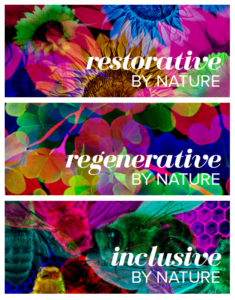WILFUL AGENCY LAUNCHES WITH CLIMATE INNOVATION FOCUS
Communications taskforce to support low carbon, regenerative economy
19 October 2021, London
Wilful is a new agency that works at the intersection of tech innovation and sustainability to help clients amplify and scale solutions to the climate emergency.
The agency is built on the merger of its founding taskforce members, Cherish and Gong Communications. The agency works internationally from its London HQ with established partner networks in Europe, Asia Pacific and Africa. Digital agency Loud and start-up specialist Little Bear join brand design agency Made With and Gong Creative in the launch taskforce line-up with the additional sustainability expertise of author and brand strategist, John Grant. Wilful’s Chair is Mike Rowe, founder of digital agency group 1000Heads.
The agency launch co-incides with an unprecedented global push to find solutions to the climate emergency and more sustainable ways of living. Investment capital is being funneled to fund climate innovation across all sectors with sustainable food and mobility overtaking renewable energy.
In the first half of 2021:
- Private equity firms have raised more than $180 billion of climate finance
- VC funding for climate tech topped $16bn
- COP26 host Boris Johnson is redoubling efforts to secure £100bn a year in climate funding for developing countries.
And in October, the EU launched its first green bond, the world’s largest to date, raising €12bn to finance member nations’ environmental initiatives.
Wilful co-founders Rebecca Oatley and Narda Shirley navigated the last period of rapid innovation and disruption together in the early 2000s at PR agency Gnash, when the internet inspired a generation of entrepreneurs to challenge the status quo. Wilful is their new joint venture, drawing on their extensive combined experience working principally in digital disruption, finance, development and sustainability.
Commenting on the market, Rebecca noted, “We are in another phase of rapid technology innovation with capital chasing game changing ideas and visionary entrepreneurs. This time, the stakes are much higher, we need to help the most promising innovations to find their audiences to successfully make the leap to a sustainable low carbon future.”

Wilful Co-Founder, Narda Shirley added, “Organisations that are gearing up for the transition to a low carbon future need a communications partner that can keep pace with the speed of change and the ability to react quickly to opportunities without compromising on the quality of the advice. Reassuringly, we are seeing plenty of brilliant innovations out there already, from big corporates as well as from start-ups. The challenge now is to help the best ones get to scale, which is where we believe communications has a key role to play.”
Some of Wilful’s recent work includes support for carbon removal marketplace, Puro.earth, seaweed bio-refinery and industry catalyser Oceanium, and Unreasonable Group, building community between entrepreneurs, investors and institutions to solve pressing global problems.

ABOUT WILFUL
Wilful is a new kind of communications agency that works at the intersection of innovation and sustainability to amplify the ideas solving the world’s biggest problems. The Wilful team is on a mission to help clients in the transition to a low carbon, regenerative economy.
Wilful’s task force approach blends disciplines to deliver an agile and adaptable client service drawing on the expertise of two well established agencies with a complementary focus: Cherish with its track record of working with mass market digital disruptors and Gong with its focus on corporate and B2B, often in sustainable development.
Headquartered in London, Wilful has a global network of partners: in Africa it is anchored by Gong’s business in Kenya and in Europe and the US it is represented by Over There, the group of independent agencies that Cherish co-founded.
Contact:
Jo Hooke: Jo.Hooke@thewilful.com
Richa Kundnani: Richa.Kundnani@thewilful.com


















